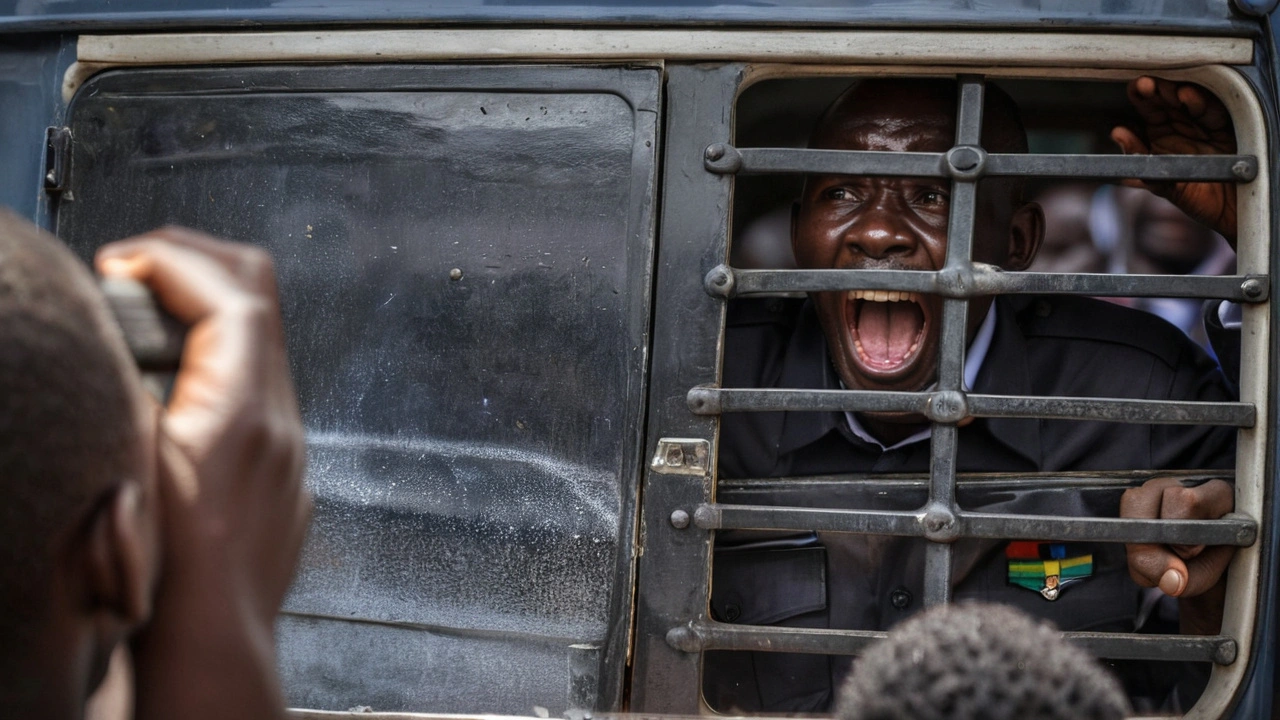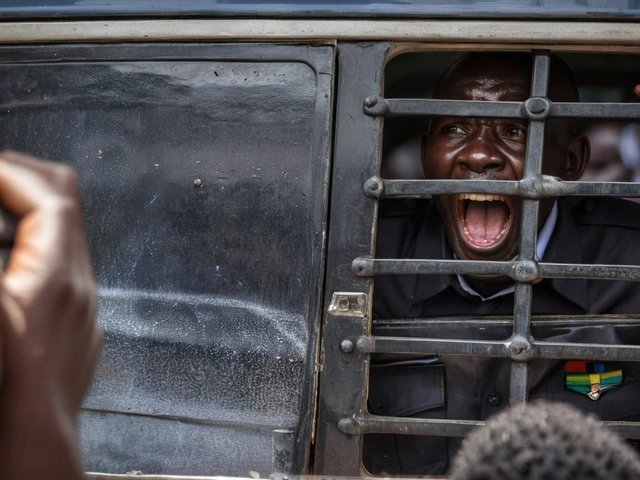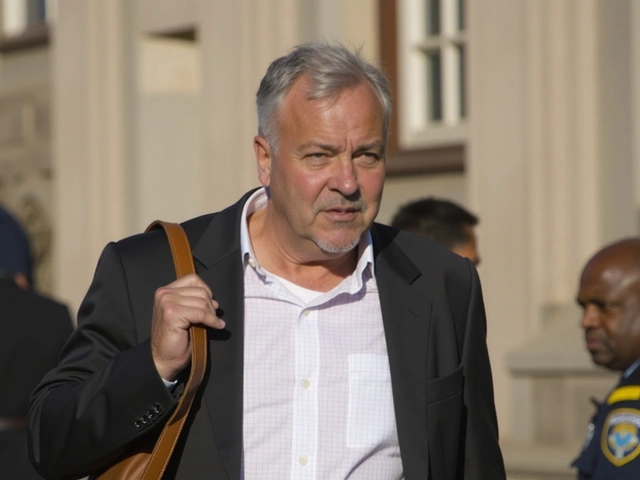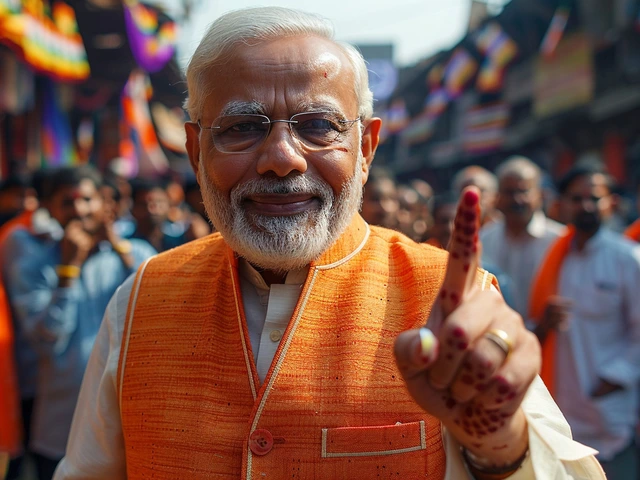
Massive Anti-Corruption Protests Ignite in Uganda’s Capital Inspired by Kenyan Activism
Kampala, Uganda, was alight with tension and fervor on Tuesday, as hundreds of individuals took to the streets in protest against what they perceive as deep-rooted corruption within the nation's highest echelons of power. Inspired by the recent triumphs of protests in neighboring Kenya, where street demonstrations led to President William Ruto dismissing nearly his entire cabinet over a controversial tax proposal, Ugandans hoped for similar results. Yet, their aspirations met a swift and heavy-handed response from Ugandan security forces.
The heart of the protest was aimed squarely at the parliamentary building, a potent symbol of political power. Protesters converged in various parts of Kampala, organized into small, determined groups despite the government's pronouncement that such gatherings were illegal. The security presence was overwhelming, with police and military personnel deployed across the city. The interaction between protesters and security forces quickly became confrontational; numerous demonstrators were forcibly detained and bundled into trucks, sparking national outrage.
Root Causes of Protest
The immediate trigger for these demonstrations was the mounting allegations of corruption against Speaker of Parliament Anita Among. Both the United States and the United Kingdom have sanctioned her, accusing her of significant malfeasance, which she vehemently denies. Despite the gravity of these allegations, the Ugandan government's response has been dismissive, with President Yoweri Museveni issuing stern warnings to protestors, branding their actions as 'playing with fire' and asserting that street protests would not be tolerated.
Museveni's stance contrasts sharply with his earlier promises of a crackdown on corruption. Upon his re-election in 2021, Museveni had pledged to address the corruption that many Ugandans believe is endemic within the government. However, critics argue that little has changed, with high-level officials often being shielded from prosecution. This perception has only been reinforced by the case of Among, and it has fueled widespread skepticism about the president's commitment to rooting out corruption.
Public Sentiment and Online Activism
Public frustration has been brewing for months, intensified by online revelations of irregular expenditures and other abuses of power tied to Among's office and associates. These online exposés have provided a rare glimpse into the opaque workings of parliamentary spending, galvanizing public opinion against perceived misconduct. The revelations prompted an official investigation into Among's wealth and detailed charges of misusing parliamentary resources for personal gain.
In response to these allegations and the lack of substantial action from the government, activists took to social media, rallying support for street protests. The success of Kenyan activists, who managed to force significant political concessions through organized street demonstrations, provided a blueprint and inspiration for Uganda's protest movement.
On the day of the protests, social media was inundated with images and videos of the demonstrations and the ensuing crackdowns. Hashtags calling for justice and transparency trended across platforms, drawing international attention to Uganda's struggle with corruption and governance. Activists argue that digital platforms have played a crucial role in circumventing traditional media restrictions and spreading their message.
International Reactions and Implications
The international community has closely monitored the unfolding events in Uganda. Sanctions from the US and UK against Among have underscored the global concern over corruption within Uganda's political system. These sanctions have added pressure on the Ugandan government to take concrete action against corrupt officials, though the response from Kampala has been defiant rather than conciliatory.
President Museveni's administration has often bristled at outside interference, framing it as a challenge to Uganda's sovereignty. However, the sanctions have emboldened domestic critics and protesters, who view foreign condemnation as validation of their grievances. The crackdown on Tuesday's protests is unlikely to quell the public's anger; if anything, it may amplify calls for greater transparency and accountability.
Many international observers are particularly concerned about the implications for Uganda's stability. The country has long been considered a key ally in the region, particularly in matters of security and counter-terrorism. Prolonged civil unrest could destabilize the nation, with far-reaching consequences for the broader East African region.
A History of Suppression and Hope for Reform
Museveni's tenure, which began in 1986, has been marked by a complex interplay of development and repression. While Uganda has seen significant economic growth and development under his rule, this progress has been accompanied by increasing accusations of human rights abuses and suppression of dissent. The president's recent warnings to protesters echo a long history of using state security apparatus to maintain control and stifle opposition.
Yet, despite the risks, many Ugandans are undeterred. The anti-corruption campaign has sparked a broader conversation about governance, justice, and the future of Uganda's democracy. Activists and ordinary citizens alike are calling for a new era of transparency and accountability, a vision that is gaining traction despite the challenges.
The events unfolding in Kampala serve as a litmus test for the country's political future. As Ugandans take to the streets, they are not just protesting against corruption; they are demanding a government that truly serves its people. Whether these protests will lead to meaningful change or further entrenchment of the status quo remains to be seen. What is clear, however, is that the call for justice and reform cannot be silenced.







Hey folks, let’s rally around the brave souls marching in Kampala-this is more than a protest, it’s a movement of collective empowerment! The synergy of grassroots activism and digital activism is creating a kinetic wave of accountability that could reshape governance across East Africa. By leveraging social media amplification, we’re witnessing a disruptive paradigm shift where ordinary citizens become the architects of transparency. Stay hopeful, stay loud, and remember: solidarity is the ultimate catalyst for systemic change.
Corruption is a moral abyss that no leader should ever be allowed to inhabit.
The elite puppeteers in Kampala are nothing but pawns of a global oligarchic cabal!!! Their so-called 'security forces' are merely enforcers for a shadow network that thrives on our silenced dissent!!! Wake up, citizens, before the next covert operation trims the wings of liberty!!!
When we examine the tapestry of civic resistance, we see that each thread of dissent weaves a larger narrative of societal self‑realization. The Ugandan protests echo a historic dialectic between authority and the awakened collective conscience. In this dialectic, the act of gathering in public squares transcends mere dissent; it becomes an ontological assertion of human dignity. Let us therefore appreciate the metaphysical reverberations of these streets, where hope collides with systemic inertia, forging a new epistemic horizon for governance.
It is with a deep sense of empathy that I observe the unwavering courage demonstrated by the demonstrators in Kampala. Their steadfast commitment to transparency, despite facing formidable opposition, underscores a profound dedication to civic responsibility. I commend their resolve and extend my sincere solidarity, hoping that their voices may catalyze substantive institutional reforms.
The protesters’ strategic utilization of digital platforms has effectively amplified their messaging, thereby increasing public awareness of alleged misconduct. Moreover, the coordinated peaceful assemblies reflect an organized civil response to perceived governance deficits. Such initiatives, when conducted within a lawful framework, can foster constructive dialogue between citizens and authorities.
The recent anti‑corruption demonstrations in Kampala represent a theatrical convergence of political grievance and collective yearning for accountability.
From a syntactic perspective, the chants echo a rhythm that juxtaposes the cadences of protest with the dissonance of bureaucratic obfuscation.
Analysts have meticulously catalogued the myriad inconsistencies in the official narratives, exposing glaring semantic fallacies that betray a concerted effort to manipulate public perception.
The media’s selective framing of these events further amplifies the narrative dissonance, thereby engendering a feedback loop of misinformation.
It is imperative to note that the protesters have adhered to a disciplined code of conduct, refraining from vandalism while articulating their demands with rhetorical precision.
This disciplined approach underscores the intellectual maturity of the movement, contrasting sharply with the caricatured depictions propagated by state‑aligned outlets.
Moreover, the deployment of digital evidence, including leak documents and forensic financial analyses, provides an evidentiary backbone that fortifies the moral argument against corruption.
Such documentation is not merely anecdotal; it constitutes a corpus of data that withstands scrupulous cross‑examination.
The government's heavy‑handed response, however, betrays a paradoxical reliance on coercive tactics that undermine the rule of law.
By employing excessive force, authorities inadvertently validate the protesters’ contention that systemic rot necessitates radical reform.
International observers have highlighted this dissonance, noting that the suppression of peaceful assembly contravenes established human‑rights conventions.
Yet, the geopolitical calculus of external actors remains ambivalent, oscillating between diplomatic censure and strategic non‑intervention.
This ambivalence perpetuates a climate of uncertainty, wherein domestic actors must navigate both internal repression and external scrutiny.
In light of these dynamics, the Kampala protests serve as a case study in the sociopolitical mechanics of dissent within semi‑authoritarian regimes.
The eventual trajectory of this movement will hinge upon the capacity of civil society to sustain momentum without succumbing to fragmentation.
Therefore, it is incumbent upon scholars, policymakers, and engaged citizens alike to monitor these developments with rigorous analytical rigor and an unwavering commitment to truth.
Bold move Sheri-your deep dive shines a light on the core issues; keep the spotlight bright
When the streets of Kampala pulse with the rhythm of dissent, you can feel the raw energy of a nation demanding change. It’s a testament to the power of collective voice that digital threads and physical marches intertwine, forging a narrative that no oppressive regime can easily silence. Let’s amplify these stories, celebrate the courage on the ground, and keep the conversation alive beyond headlines. Unity and perseverance are the twin engines that will drive this movement forward.
I commend the unwavering dedication displayed by the demonstrators and endorse a constructive path forward. It is essential that all stakeholders engage in dialogue rooted in mutual respect and a shared commitment to transparent governance. May this impetus for reform inspire sustained civic participation and responsible leadership.